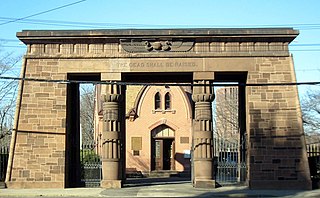
Skull and Bones is an undergraduate senior secret student society at Yale University in New Haven, Connecticut. The oldest senior class society at the university, Skull and Bones has become a cultural institution known for its powerful alumni and various conspiracy theories. The society's alumni organization, the Russell Trust Association, owns the organization's real estate and oversees the membership. The society is known informally as "Bones", and members are known as "Bonesmen".
Samuel or Sam Martin may refer to:

Grove Street Cemetery or Grove Street Burial Ground is a cemetery in New Haven, Connecticut, that is surrounded by the Yale University campus. It was organized in 1796 as the New Haven Burying Ground and incorporated in October 1797 to replace the crowded burial ground on the New Haven Green. The first private, nonprofit cemetery in the world, it was one of the earliest burial grounds to have a planned layout, with plots permanently owned by individual families, a structured arrangement of ornamental plantings, and paved and named streets and avenues. By introducing ideas like permanent memorials and the sanctity of the deceased body, the cemetery became "a real turning point... a whole redefinition of how people viewed death and dying", according to historian Peter Dobkin Hall. Many notable Yale and New Haven luminaries are buried in the Grove Street Cemetery, including 14 Yale presidents; nevertheless, it was not restricted to members of the upper class, and was open to all.

Daniel Coit Gilman was an American educator and academic. Gilman was instrumental in founding the Sheffield Scientific School at Yale College, and subsequently served as the third president of the University of California, as the first president of Johns Hopkins University, and as founding president of the Carnegie Institution. He was also co-founder of the Russell Trust Association, which administers the business affairs of Yale's Skull and Bones society. Gilman served for twenty five years as president of Johns Hopkins; his inauguration in 1876 has been said to mark "the starting point of postgraduate education in the U.S."

The Boston Brahmin or Boston elite are members of Boston's traditional upper class. They form an integral part of the historic core of the East Coast establishment, along with other wealthy families of Philadelphia and New York City. They are often associated with the distinctive Boston Brahmin accent, Harvard University, Anglicanism and traditional Anglo-American customs and clothing. Descendants of the earliest English colonists, such as those who came to America on the Mayflower or the Arbella, are often considered to be the most representative of the Boston Brahmins.

William Huntington Russell was an American businessman, educator, and politician. Notably, he was a co-founder of the Yale University secret society Skull and Bones. He was a descendant of several old New England families, including those of Pierpont, Hooker, Willett, Bingham, and Russell. His ancestor Rev. Noadiah Russell was a founder and original trustee of Yale College.

Samuel Stebbins Bowles, is an American economist and Professor Emeritus at the University of Massachusetts Amherst, where he continues to teach courses on microeconomics and the theory of institutions. His work belongs to the Neo-Marxian tradition of economic thought; however, his perspective on economics is eclectic and draws on various schools of thought, including what he refer to as post-Walrasian economics.

Linonia is a literary and debating society founded in 1753 at Yale University. It is one of the university's oldest secret societies.
Events from the year 1803 in Ireland.
Samuel Smith may refer to:
Russell or Russ Smith may refer to:
The Reverend Noadiah Russell was a Congregationalist minister, a founder and trustee of Yale College, and one of the framers of the Saybrook Platform.

The Queen Victoria Memorial in Lancaster, Lancashire, England, is a Grade II* listed building. It stands in the centre of Dalton Square, Lancaster facing Lancaster Town Hall.
It was erected in 1906, being commissioned and paid for by James Williamson, 1st Baron Ashton.

Reuben Atwater Chapman was an American attorney who served as chief justice of the Massachusetts Supreme Court from 1868 until his death in 1873. As a youth he was employed as a store clerk in Blandford, Massachusetts when he was given the opportunity at the age of 19 to read law as a clerk in a law office. Admitted to the bar, he successively practiced in Westfield, Monson, and Ware, before settling in Springfield, Mass., where he practiced in partnership with Whig politician George Ashmun as Chapman & Ashmun. The firm became one of the most successful in the state and in 1860 Chapman was appointed an associate justice of the state supreme court, subsequently being elevated to chief justice in 1868. He was a presidential elector for Lincoln in 1860, and served on the Harvard Board of Overseers. He handled some legal matters for John Brown when Brown was in business in Springfield, and later, when Brown was imprisoned in Virginia facing hanging after the abortive Harper's Ferry raid, he wrote to Chapman asking him to either come himself or send legal assistance: "I have money in hand here to the amount of $250 [...] do not send an ultra abolitionist," which Chapman was unable to do at the time. Chapman died in Switzerland in 1873.
John Wickes (1609-1676), also known as John Wick and John Wicks, was an early settler of the Colony of Rhode Island and Providence Plantations and a co-founder and original purchaser of Shawowmet. He was born in 1609 in Staines, Middlesex, England. His father Robert Wickes had four sons: Thomas, John, Francis, and William.









